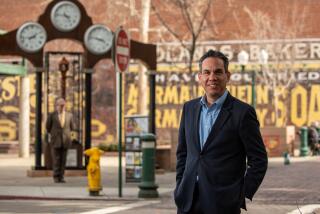Democrats Bring Back Their Hit Man : Tony Coelho, who rapped GOP ethics but took tainted S&L; perks, returns to guide party.
- Share via
In his inaugural address, President Clinton said that Washington had become “a place of intrigue and calculation,” where influential people and special interests maneuver for position. “Let us resolve to reform our politics,” he proclaimed, “so that power and privilege no longer shout down the voice of the people.”
America recently got a sign of how far the Clinton presidency has strayed from those noble sentiments. On orders from Leon Panetta, White House chief of staff, Democratic National Chairman David Wilhelm has relinquished much of his authority to a new “special adviser”: former congressman Tony Coelho of California. Power, privilege and cutthroat politics--for Coelho, they’re not a problem but a way of life.
As chairman of the Democratic Congressional Campaign Committee during the 1980s, Coelho had a simple creed, which he summed up in a speech to a lobbying group: Special interest is not a nasty word.” As a Democratic colleague once said, Coelho gained “a reputation as the guy who sucked up all the PAC money in the world.” He may have exaggerated, but only a little. Coelho aggressively solicited special-interest money by making bald references to his party’s power. “Business has to deal with us whether they want to or not,” he once said. On another occasion, he offered: “We’re going to be in the majority for a very long time, so it doesn’t make good business sense to give to Republicans.”
In a 1986 article, journalist Gregg Easterbrook put it another way: “If that pitch sounds like a mixture of protection racket (nice little multinational you have there; too bad if anything should happen to it) and an offer to play ball, that’s exactly how it was intended to sound.” Books such as “Honest Graft” and “The Big Fix” detail how the savings-and-loan industry, among others, used its privileged access to shape regulatory legislation during the 1980s.
Coelho’s attitudes toward privilege also colored his view of justice. In 1981, he wrote a letter on congressional stationery seeking a lighter sentence for a campaign donor’s son who had been convicted of a brutal murder. In 1989, he ardently defended a congressional aide whose criminal past had been uncovered by the Washington Post. Years earlier, according to the news account, the aide had assaulted a woman with a hammer and knife, but served only 27 months in prison. Though the aide had since risen to the top of the Capitol staff world, he never offered his victim any financial assistance. “Rightly or wrongly,” Coelho said, the aide “owed his debt to society, not to this young woman.”
It would be strange if Coelho emerged as party spokesman on crime victims’ rights.
That probably won’t happen, since Coelho always viewed public policy as a means to political victory, not an end in itself. “He comes out of the California school of politics,” one Democratic aide said, “media and a lot of flash.” As Coelho himself told columnist James Kilpatrick in 1984: “The issues are not that important to people. Issues will take care of themselves.”
As the House Democrats’ campaign chief, Coelho subordinated ideas to attacks: “My job is to be the hit man.” In 1982, he tried to frighten elderly Americans into believing that Republicans would take away Social Security. He candidly admitted: “If the psychology of fear is reversed, then people will listen to the Republican message.”
Coelho also attacked GOP ethics, but he eventually encountered ethical problems of his own. During the 1980s, a troubled savings-and-loan paid for a number of dockside cruises and parties for Coelho, who used the events to entertain rich political donors. When the arrangement was exposed, the campaign committee and Coelho’s own reelection fund reimbursed the S&L.; In 1989, the press revealed that an executive of another troubled thrift had bought Coelho a $100,000 junk bond and that Coelho repaid the executive with money partly borrowed from the S&L.; By failing to disclose the loan, Coelho had apparently violated House rules and opened himself to withering criticism. Under fire, he resigned from Congress.
Only after his resignation did Coelho reveal the true depth of his cynicism. At the 1988 Democratic convention, he had thundered: “When the titans of Wall Street were looting the small investors on Main Street, where was George Bush?” Coelho pledged that his party would fight “the corporate cannibals on Wall Street.” So what did he do after leaving the Hill?
He became a New York investment banker.
More to Read
Get the L.A. Times Politics newsletter
Deeply reported insights into legislation, politics and policy from Sacramento, Washington and beyond. In your inbox twice per week.
You may occasionally receive promotional content from the Los Angeles Times.










